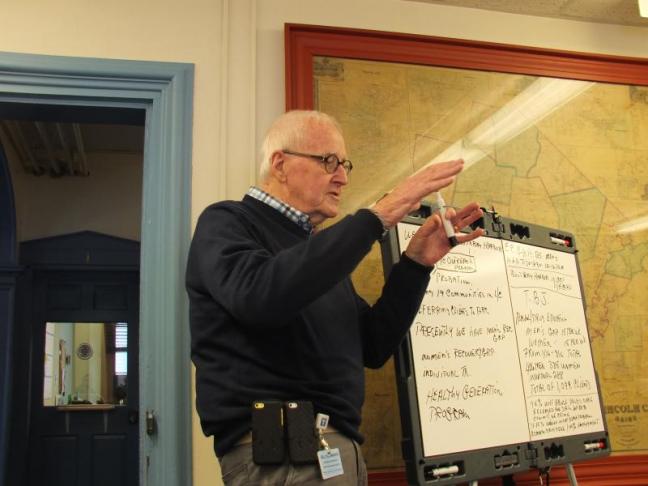Maker: ‘Ellsworth can’t be replaced’
Bill Ellsworth was 80 when he died in a motor vehicle accident in Nobleboro Dec. 6. He’d recently been ill and had been considering retirement, according to Lt. Rand Maker of the Lincoln County Sheriff’s Office. He was a tireless counselor, universally acknowledged to be overworked with his numerous addiction resource outpatient programs, recently expanded to Boothbay, Waldoboro, as well as the home office in Wiscasset, and his work at Two Bridges Regional Jail, and one-on-one treatment, mostly with people diverted from the jail system, treating hundreds of people every year. Last year, he was given an assistant, Angie Musto, who received more hours from county commissioners in October as the program expanded.
“Bill can’t be replaced,” Maker said. “We have Angie to continue the work, but what he did was unique.” And Musto is now bumped up to full-time, with a caseload of hundreds of people. “Lincoln Health or Mid Coast will have to hire someone soon to add to the program,” he said, acknowledging Musto could not do all the outreach, the work at the jail, the diversion supervision, and the one-on-one treatment in the basement of the Sheriff’s office.
The two colleagues also had very different styles in how they dealt with clients. Gusto's is gentler. In an interview last year, Musto said women suffering from addiction are often dealing with different issues than men – their inability to deal with financial issues they fear might affect their family, home and children, and problems in their primary relationships, she said, often cause them to try to escape from what they consider a hopeless situation through drugs and alcohol, but that’s only a temporary respite. “Then they find themselves in even more serious problems, new problems, often worse problems, that they have to work out. But the fears are the same. They fear losing their kids, their jobs, being homeless, not having enough money to take care of their kids’ basic needs.” Musto’s view is that people, but mostly women, in those situations, have to be handled differently than people suffering from addiction for other reasons.
Ellsworth’s style was more confrontational than Musto’s, Maker said. “Bill would say, ‘We’re here to help, but you have to get your act together and take accountability.’ He could really get in people’s faces and force them to look at their actions and how their actions are affecting not only their lives, but the lives of the people who depend on them.” His style also worked – together, Ellsworth and Musto had a strong success rate. Many of their clients face jail time if they cannot stay clean. Even after the diversion part of their supervision program ends, many still come to group meetings and one-on-one meetings. Due to Ellsworth’s dedication to offering support to keep substance abusers sober and clean for life, 85 percent of those who have participated in the program in the past year have remained free of drugs and free from jail.
Musto said she is currently covering all the group meetings that are scheduled. “Obviously we’re going to need additional support,” she said. Her supervisor, Catherine McConnell of Mid Coast Hospital, who will help hire new staff, said she was working on short-term and long-term plans to help solve the staffing shortage, and any new job would be full-time. Like Maker, McConnell said Ellsworth was irreplaceable. “We’ll do our best to make sure all the programs, which now includes Damariscotta, are staffed with people who are trained in recovery support,” she said. People will be borrowed from programs as interviews are conducted.
Musto said O’Connell knows what the basic issues are in the group meetings. “Catherine attended all the meetings this week with me,” she said.
A call to Col. James Bailey at TBRJ, which also relies heavily on the ARC program, was not immediately returned.
The need for addiction support, especially for opioid addiction, is great in Lincoln County, and Ellsworth’s loss is a huge blow, Maker said. But Ellsworth and Musto weren’t the only ones dealing with diversion, at least. The Sheriff’s Office has its own diversion program. Deputies staff it. “I’m sure together we’ll find a way to make it all work in the short term,” he said. “But there is no denying the need is great and we’re going to have to really pull things together quickly.”
That’s because the hard work to provide services, especially to those in far-flung parts of the county like Boothbay and Waldoboro is still in its infancy. “We can’t afford to lose those folks from Waldoboro and Boothbay,” Maker said. “They don’t have transportation to get to Wiscasset, most of them, so if the programs go away, we’ll probably lose them.”
Maker said the Sheriff’s Department plans a special event to honor Ellsworth. “His wife is still in the hospital, and she needs to regain her own health before we think about anything like that,” he said.
Event Date
Address
United States























